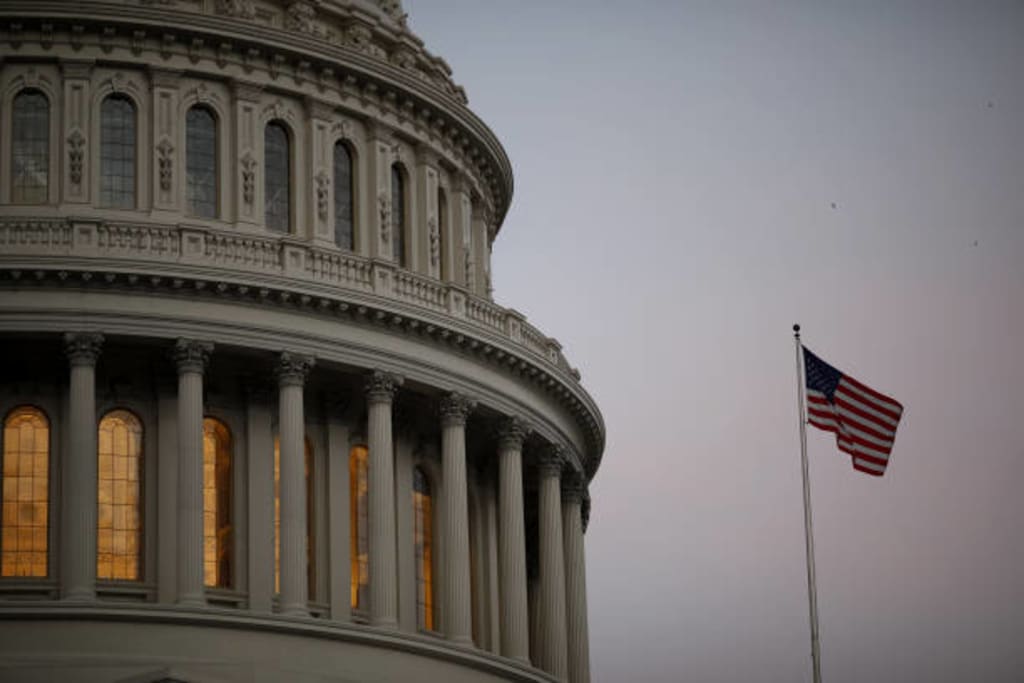Congress Averts Government Shutdown, but GOP Infighting Threatens Stability
government

The United States Congress narrowly avoided the negative effects of a government shutdown on Saturday thanks to an extraordinary show of bipartisan cooperation. The bill, which was approved by a vote of 335-91 in the Republican-controlled House of Representatives, gives federal agencies a 45-day extension and averts a budget shortfall that was about to occur as previous appropriations were about to expire.
However, the passage of this stopgap measure has not only averted an immediate crisis but has also ignited internal divisions within the Republican Party, with House Speaker Kevin McCarthy finding himself at the center of a political storm. The dissatisfaction stems from a perception among party hardliners that McCarthy's strategic move to garner support from Democrats reveals a compromise with the so-called "Uniparty" in Washington, a term often used to suggest collaboration between moderate Republicans and Democrats.
This internal strife within the Republican ranks has the potential to reshape the leadership dynamics within the House. The discontent has manifested on social media platforms, with Representative Andy Biggs, a vocal hardliner, openly questioning McCarthy's leadership on X (formerly Twitter). The brewing discontent is not merely an isolated incident but represents a broader ideological struggle within the GOP, pitting party unity against the need for effective governance.
McCarthy's decision to pursue a vote on a measure that could secure Democratic support, even at the risk of alienating his own party, underscores the delicate balance that leaders must navigate in a deeply polarized political landscape. In response to the growing discontent, McCarthy, seemingly unfazed, challenged his critics with a defiant "Go ahead and try," acknowledging the potential consequences of his pragmatic approach to crisis management.
The possibility of McCarthy's ouster has triggered speculation about potential successors. Some Democrats have hinted at potential support for McCarthy, recognizing the importance of stability during uncertain times. Others within the Democratic camp have expressed a willingness to back a moderate Republican candidate who would be open to power-sharing arrangements within House committees. The internal dynamics of the GOP's leadership struggle present a nuanced picture of the challenges inherent in forging bipartisan cooperation amid increasing ideological polarization.
However, not all Democrats are willing to back a Republican speaker. Hakeem Jeffries, the head of the House Democrats, has received some indications of support, underscoring the limitations of inter-party cooperation in the choice of a new speaker. The complex dance of potential coalitions and splits inside the Republican Party highlights the difficulty of controlling internal tensions in a political environment characterized by stark ideological differences.
This internal strife within the GOP comes at a critical juncture for President Biden. Already facing low poll numbers and concerns about the economy as he seeks reelection, the potential fallout from a government shutdown adds another layer of complexity to the challenges confronting the Biden administration. The specter of a shutdown, with its economic and political ramifications, underscores the high stakes involved in maintaining stability and effective governance in Washington.
The roots of the current political crisis trace back to the earlier standoff over raising the debt limit earlier this year. The recurring challenges in reaching a consensus on critical fiscal matters highlight the systemic issues that contribute to the recurring specter of government shutdowns. The stopgap measure, while averting an immediate crisis, raises questions about the long-term viability of relying on short-term solutions to address fundamental fiscal challenges.
As the political landscape continues to shift, the aftermath of this internal party conflict remains uncertain. The potential implications for the balance of power within the House and the broader political landscape in Washington are far-reaching. The GOP's internal divisions may not only influence immediate legislative priorities but could also shape the party's identity and strategy heading into future elections.
The difficulties President Biden is having serve as more evidence of how complicated the current political environment is. A nuanced strategy is necessary to manage internal party tensions while negotiating larger national challenges. Shalanda Young, the director of the White House budget, responded to the potential of a shutdown by accusing Republicans of treating people's lives carelessly. Effective governance is even more urgent given the real-world repercussions of a government shutdown, such as federal workers missing paychecks and key services being interrupted.
In the face of criticism, McCarthy's decision to prioritize pragmatism over ideological purity reflects the inherent tensions within a party grappling with the complexities of governance. Hardliners' use of the term "uniparty" to criticize perceived collaboration with Democrats exemplifies the difficulty of finding common ground in a polarized political environment. The GOP's uneasy dance between pragmatism and ideological purity is emblematic of the larger challenges confronting American politics in an era of deep partisan divisions.
The current state of affairs in Congress is a microcosm of the bigger issues the nation is presently facing. The potential for prolonged government shutdowns caused by political acrobatics and ideological conflicts highlights the need for institutional changes that promote budgetary responsibility and reduce the likelihood of such crises. The brief reprieve from the interim legislation should give lawmakers a chance to have in-depth, bipartisan discussions about long-term fiscal solutions.
The future of House Speaker Kevin McCarthy is still up in the air as the political drama plays out. The ramifications go beyond the current crisis, regardless of whether the GOP's internal conflicts result in a change in leadership or a reevaluation of the party's policy. The delicate balancing act between party unity and successful leadership will always be one of America's defining characteristics. politics, shaping the trajectory of legislative priorities and the broader political landscape for years to come





Comments
There are no comments for this story
Be the first to respond and start the conversation.